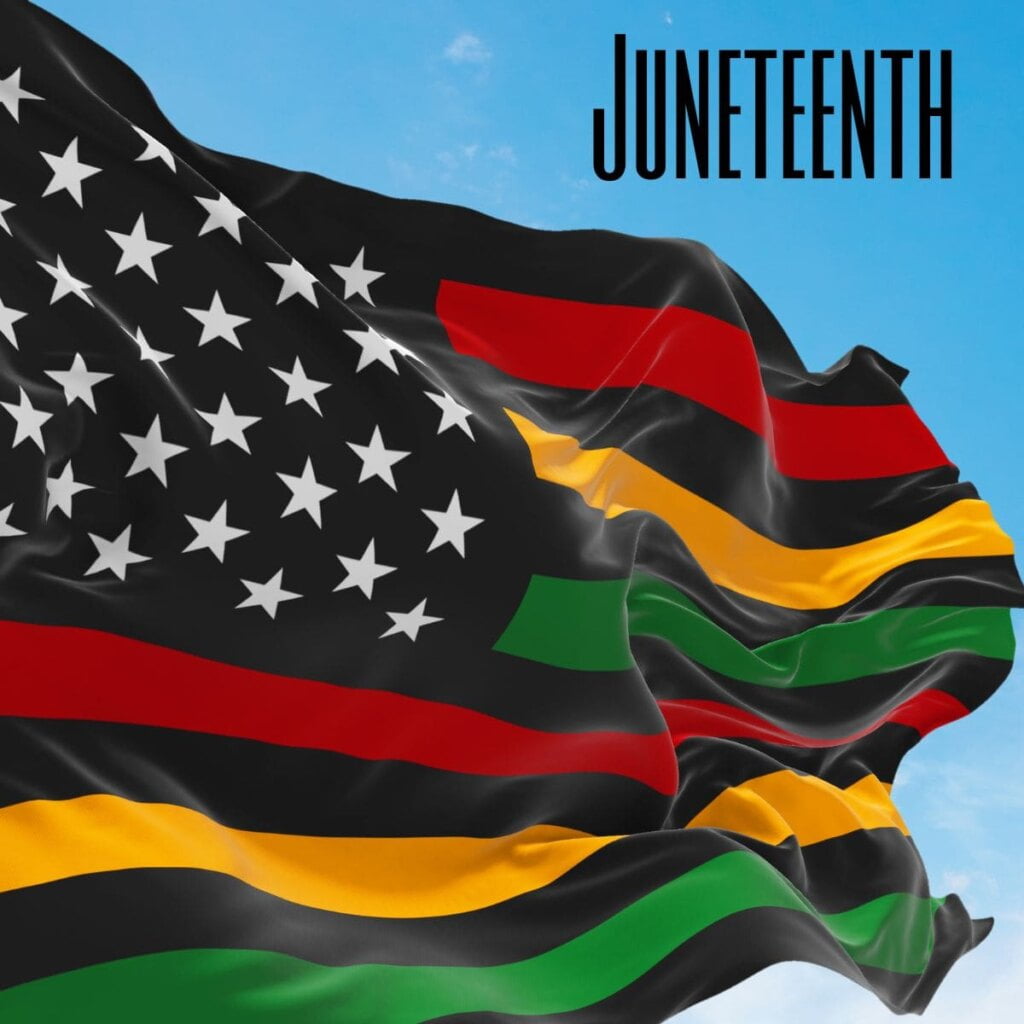Juneteenth is a nationally observed celebration marking the end of legal slavery in the United States. It became a national holiday on June 17, 2021, when President Joseph Biden signed the Juneteenth National Independence Day Act, which establishes June 19th as the official Juneteenth federal holiday.
June 19th, 1865 is the day we now celebrate as Juneteenth; the day when Union soldiers arrived in Texas announcing the end of slavery, effectively ending one of the last holdouts for people interested in owning other human beings and using them for their own profit.
In the State of California, this holiday is also recognized by proclamation; in 2022 Governor Gavin Newsom decreed a Juneteenth National Freedom Day for the state.
Juneteenth will next be observed on Wednesday, June 19, 2024.

A Brief History Of Juneteenth
When President Abraham Lincoln contemplated his signature on the Emancipation Proclamation, he likely realized how difficult it might be to fully prohibit and enforce a prohibition on legal slavery in the United States. But he wasn’t contemplating that in a vacuum; many soon-to-be-former-slaves gathered on “Freedom’s Eve”, January 1, 1863, hoping to hear the news that officially confirmed the passing of the Emancipation Proclamation. Hopes at the time were obviously high, but disappointment was coming.
The official Proclamation was signed in 1863, but a practical end to legal human trafficking in the United States would take more time to enforce.
In spite of the Presidential order, slave owners in southern states persisted, refusing to give up what they considered to be legal ownership of other human beings, a concept recognized today as barbaric.
The plantation owners’ days were numbered, in spite of their refusal to accept the realities of American law. Does that sound too close for comfort in light of certain 21st-century political controversies? As Juneteenth teaches us, outdated ideology does not shield one from the consequences of refusing to change or adapt for the common good.
That is why it wasn’t until 1865 for slavery to officially end in America; there were still people in the State of Texas who refused to stop exploiting other humans for their own profit through forced labor.
Federal Troops Required
Enforcement of the Emancipation Proclamation was difficult, and those in Texas likely didn’t feel intimidated by the Presidential order. But in 1865, federal troops arrived in Galveston, Texas to begin enforcing the end of slavery.
The fact that slavery took an additional two years to “trickle down” to those enduring forced labor in Texas is a sore spot for many. But in the end, freedom won in spite of the best efforts of some who preferred slave ownership.
General Order Number 3: Making Juneteenth Possible
General Order Number 3 is the military document that made Juneteenth happen. It begins with a simple declaration. “The people of Texas are informed that in accordance with a Proclamation from the Executive of the United States, all slaves are free.”
General Order Number 3 goes on to formally codify this in specific ways. The Order says freeing slaves, “involves an absolute equality of rights and rights of property between former masters and slaves, and the connection heretofore existing between them becomes that between employer and hired laborer.”
It’s no surprise that multiple sources report that many slaves immediately fled their captors before their former so-called owners had a chance to finish offering a new arrangement; the victims of human trafficking are rarely treated with any form of dignity and these newly liberated people were no exception.
Many chose to go north for obvious reasons–and unfortunately, that thinking wasn’t always rewarded. Even some more liberally-minded areas had pockets of intolerance and resistance to change as a great migration began from slave plantations to freedom. But there was a major relocation effort underway, regardless.
General Order Number Three was read to the Texas public on June 19, 1865, and that day has been informally or formally celebrated as Juneteenth practically ever since. Some former slaves made return journeys to Galveston to commemorate the anniversary of their freedom, while others chose to start celebrating this then-new holiday in their new homes elsewhere.
Celebrating Juneteenth
According to sources like Juneteenth.com, there are many ways people traditionally celebrate June 19th; sports, barbecues, rodeos, and rallies are common.
People once owned as slaves were deliberately dehumanized by their “masters” who, often with the backing of local laws, refused to let slaves wear clothing. Fashion is, for some participants, an important part of celebrating this day as a way to reclaim what was once taken away.
Nationally, Juneteenth has seen a surge in popularity, and many well-established organizations now support the observance with Juneteenth-themed events and campaigns. The Henry Ford Museum and the Smithsonian Institute are just two of the biggest names actively promoting the observance. But local celebrations in California also include many speeches, parades, rallies, and barbecues.
Why California Loves Juneteenth
Some might wonder why California is so invested in Juneteenth, the answer lies in the fact that during the migration from southern states, many chose to relocate to California from Texas.
The official site of the California Historical Society notes that former slaves fled their plantations for many California destinations including Los Angeles, Bakersfield, and Sacramento. At least some of these Americans headed to California to try their luck during the Gold Rush. Others may have relocated to be near family or to simply try something new. Whatever the motivation for coming, these Americans contributed much to the State of California.
In California, it’s not just the Governor signing official proclamations honoring Juneteenth; local mayors and other officials also offer their own support with official orders to observe the holiday. There are other ways to get involved–some prefer to participate more in activism, attending political rallies and get-out-the-vote efforts instead of parties.
Your local civic center, Chamber of Commerce, church, or convention center may be great places to start looking for opportunities to participate in Juneteenth events with a more political bent. All forms of celebrating this holiday are important, but those who get involved in the grassroots movements supporting Juneteenth help continue a long, proud tradition of awareness raising and building a better future.
Related Articles
| Federal & California Holiday Calendar | Rosa Parks Day |
| Fairs & Festivals in Orange County | Historic Sites in Orange County |
| Museums in Orange County | President’s Day |

